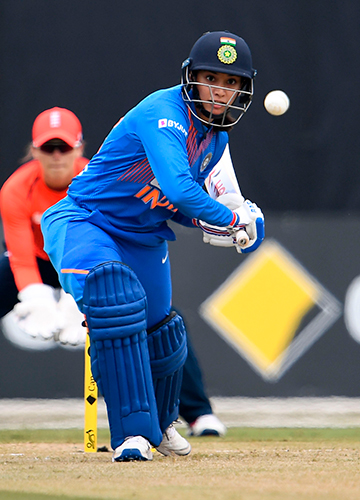FOR A WHILE now, southpaw Smriti Mandhana has set the tone for India’s batting as the opener with flair. Though early 2019 was bouncy for her, chief coach W.V. Raman, himself a former lefty opener, asked her to be patient and ignore the scoreboard pressure. The advice worked, and the 23-year-old from Sangli, Maharashtra, regained her touch. In the recently concluded tri-series against England and Australia, she scored 216 runs in five matches. Ahead of the T20I World Cup, which starts on February 21 in Australia, THE WEEK spoke to Mandhana about her form, her new opening partner and the World Cup. Excerpts from an interview:
Having seen the team reach a semi-final in the T20I World Cup and a final in the ODI version, how will you approach this tournament?
This time, I will not put any added pressure on myself. I will just enjoy my batting. That is what I have always done in a World Cup—just think of it as a regular match.
As for the team, we will look to be calm and composed and not keep thinking that it is the World Cup, because then we end up putting pressure on ourselves and [that] hampers our performance.
Does it not rankle the senior players that India has gotten close, but has not won a World Cup?
Rather, it gives you a lot of confidence that you have been there, gone to the semis and finals. That means the team is good and it is about that one day. On that particular day, someone has to click. It motivates us to go one step further.
Heading into the World Cup, how do you analyse your past season?
The one-day [season] was pretty good, but I felt I have not been at my best in T20Is; it has been on and off. It is also difficult to have that consistency [when] you have to go after every ball. But that is the challenge—to find a way to be more consistent.
For the team, 2019 was a good season overall. In ODIs, the team was already there; in T20Is, we are now getting there with youngsters like Shafali (Verma) and Jemimah (Rodrigues) coming in.
What has coach Raman told you as a former southpaw opener himself?
Raman sir has been very helpful with all batters. With me, he has always said, “You have all the shots, just have the goal of playing 30 overs in an ODI. Do not concentrate on scoring alone; you will end up getting 100 (if you stay put) or you will get 60 to 70 playing 13 overs in a T20I.” That is what I have been working on. Scoring is not the problem; it is about staying there.
You think you would be able to do so?
It is easier to do so in ODIs, with the field restrictions. Even if you do not score a boundary or two in an over, you know you have time to cover up. But to do the same thing in T20Is is difficult.
You have opened with various partners and now you have Shafali Verma. How do you approach your role?
It is scary to stand at the non-striker’s end because she is such a hard hitter. You have to be attentive otherwise you can end up being hit! (laughs).
Jokes apart, yes, initially I did not understand what my role would be. I have always been the aggressor, scoring in the first six overs. But now I try and give her strike because she scores at a high rate. However, I also realised that we both have to play our natural game. Her experience is not much, but she is mature for her age. There have been times when she has come up to me and said, ‘Didi rehne do abhi, apan baad mein maarenge (Didi, let it be, we will hit and make up later)’. Of course, I have to keep talking to her, tell her which ball to hit or leave.
There is a lot more responsibility on you—being vice captain, the main scorer and batting with a new opener.
It may sound [like] there is a lot to do, but it is normal for us. It is not an extra effort. The kind of player [Shafali] is, the World Cup will be no added pressure for her. It is her first World Cup, [and] she will play with an open mindset.
Is the team over-reliant on the top four?
That is the case in every team. Harmanpreet [Kaur], Shafali, Jemimah and I—it is our responsibility to [put up] a total for the team. With Veda Krishnamurthy and Pooja Vastrakar scoring in the Challenger [Trophy], we have good depth now. If you are 2 down for 25, it is a bit harsh to expect the middle order to get us to 170-odd.
The average scores are expected to be bigger than in previous T20I World Cups, given the wickets in Australia.
With Australian wickets, anything is chase-able and defendable. In the Women’s Big Bash League season, anything above 160 was a good total. But, in World Cups, anything like 130 can also be good.
You missed the WBBL last season. Will that affect your preparation?
Well, playing with the Indian team was more important. If the tri-series (Australia-England-India) was not there, I would have thought about the WBBL. But playing alongside my Indian teammates has been good for team bonding.


